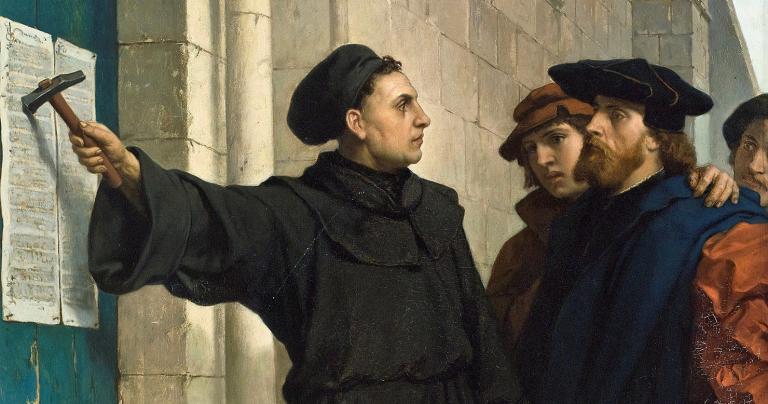Long before there were scads of costumed kids trick-or-treating, there was a Great Reformation. Our family happily celebrates both on October 31, the day that Martin Luther nails the 95 Theses to the door of the Wittenburg Church (1517). A Reformation is birthed from that moment, when Luther is merely appealing to his colleagues for informed and educational dialogue. Nailing a post to the church door is a common way to call for dialogue among the scholars of that community.
Time progresses, and like the other Magisterial Reformers (Calvin and Zwingli), Luther initially has no intention of separating from the mother church. However, he finds himself in a tangled ball of yarn that involves politics inside and outside of the church, the flow of wealth, rights of nation states, and too many factors to discuss in a short article like this.

Halloween for Reformers
From the middle of the entangled ball of yarn, Luther spins a tapestry: i.e. ministry in new ways, writings which include a Bible translation, and the formation of the fledgling Protestant church. His legacy is worth remembering on October 31st, at least after the kids have gone to bed with sugar comas after their Halloween indulgences.
This piece is a review of merely one of Martin Luther’s writings. I encourage you to find time to engage in some of his works, time that you’ll find well spent.
The Three Captivities of the Church
Martin Luther writes On the Babylonian Captivity of the Church primarily to engage the sacraments of the Roman Catholic Church. He is actually pointing out what he perceives to be their abuses of the sacraments. In a letter dated in 1519, Luther writes:
There is no reason why you or any one else should expect from me a treatise on the other sacraments [besides Baptism, the Lord’s Supper, and Penance] until I am taught by what text I can prove that they are sacraments. I regard none of the others as a sacrament, for there is no sacrament save where there is a direct divine promise, exercising our faith.[1]
Martin Luther introduces his work, pointing out some abuses of the Roman Catholic Church, and by defending his position, a belief in only three sacraments instead of seven.
i. Withholding the Cup
First of all, Luther brings us before the Lord’s Table, the sacrament of Communion. He contends against the Roman Catholic practice of withholding the element of the wine from parishioners, calling it the first captivity of the Roman Catholic Church. He cites the Lord’s instructions at the Last Supper, and His sharing of the wine with the Disciples. Essentially, Luther sees this practice as an unnecessary separation of clergy and laity, and contends that the Roman Catholic Church does not have the authority to make such decisions.
ii. Transubstantiation
The second captivity has to do with the belief in Transubstantiation, the idea that the bread and wine actually become the real body and blood of Jesus Christ during the Eucharist. Although Luther debunks this view, he accepts a more moderate view that eventually becomes known as Consubstantiation. The bread and the wine remain bread and wine, but the body and blood of Jesus Christ are somehow present in the elements.
iii. Mass as a Good Work
The third captivity of this sacrament is that most wicked abuse of all, in consequence of which there is today no more generally accepted and firmly believed opinion in the Church than this — that the mass is a good work and a sacrifice.[2]
The problem is that the Roman Catholic Church has come to rely on the Mass as a good work instead of as a practice of faith. He builds the idea of the Mass and Eucharist as a Testament of Christ, instead of merely a promise. As a Testament, of one who is about to die, the promise is made stronger to the one who is the heir. In light of the strength of the Testament and promise, we obey our Lord’s words to “take and eat.”
By believing, and by setting the Words of Christ before us, we can partake as often as we like. We can receive the promise of the Mass and Communion every day.
Deterrents to Receiving Mass
Luther expounds on the Mass. He states that there are two roadblocks that keep us from gathering the fruits of the Mass.
First, the fact that we are sinners and unworthy of such great things because of our exceeding vileness. Secondly, the fact that, even if we were worthy, these things are so high that our faint-hearted nature dare not aspire to them or ever hope to attain to them.[3]
Awe-struck by the majesty of God, Luther argues that we often start to look down upon ourselves, and our weaknesses. He combats this natural tendency with the benevolence of God, His great love for us, and with choice Scriptures. Then he adds:
For it is just this overflowing goodness of the incomprehensible God, lavished upon us through Christ, that moves us to love Him again with our whole heart above all things, to be drawn to Him with all confidence, to despise all things else, and be ready to suffer all things for Him.[4]
Clearly, our view of God is tainted, even in this time, when we think that we are not worth what He has to offer us. Luther masterfully combats this mindset that permeated the Roman Catholic Church, and still plagues us today.
Mass as a Sacrifice
Luther proposes another stumbling block, namely the idea of Mass as a sacrifice. He opposes terminology that lends itself to this belief, such as offerings, gifts, the sacrifice of the altar, etc. He believes this language suggests that the Mass is something that is done, instead of experienced by faith.
What shall we say, then, about the canon of the mass and the sayings of the Fathers? First of all, if there were nothing at all to be said against them, it would yet be the safer course to reject them all rather than admit that the mass is a work or a sacrifice, lest we deny the word of Christ and overthrow faith together with the mass.[5]
A great problem that develops in Luther’s time is reliance upon the form and works of Mass. Somehow, these sacred traditions and works are almost thought of in a magical sense, containing power in and of themselves. Luther refutes this idea, once again establishing the fact that it is our belief or faith in God that makes our interaction with Him in Mass powerful.

Pastor Jared Ingle
Long Lake Friends Church | Traverse City, MI
JC Ingle, Inc.
Ministry | Speaking Engagements | Individual, Couple, and Family Therapy with supervision
notes:
[1] Martin Luther, A Prelude by Martin Luther on the Babylonian Captivity of the Church, ed. andtrans. Albert T. W. Steinhaeuser (Philadelphia: A. J. Holman, 1915), 4. [2-5] Ibid., 19, 26, 31.













